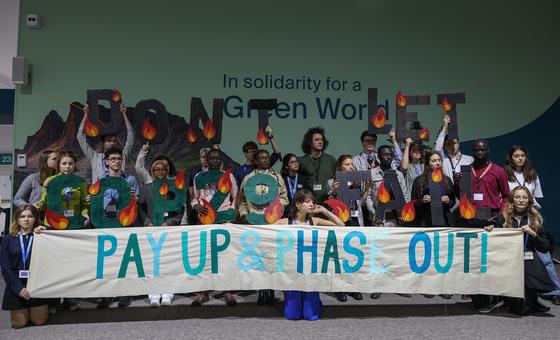The latest round of UN climate negotiations, COP29, opened this past Monday in Baku, Azerbaijan, following a year that broke multiple extreme heat records and saw widespread climate-driven chaos – from wildfires to destructive floods and to hurricanes – strike nearly every corner of the planet. A major increase in financial commitments to assist vulnerable countries in mitigating and adapting to climate impacts is the main goal of this year’s conference, which has been dubbed the “climate finance COP.”
Can countries agree on a new climate finance target?
The UN’s main climate science body, the Intergovernmental Panel on Climate Change (IPCC) has issued increasingly dire warnings about the accelerating pace of global warming. To limit temperature-rise to 1.5°C above pre-industrial levels, substantial investments are needed in clean energy technologies, infrastructure, and adaptation measures.
Developing countries, particularly small island nations and least developed countries, are disproportionately vulnerable to climate impacts like sea-level rise, extreme weather events, and droughts. They require significant financial support to build resilience, transition to low-carbon economies, and compensate for loss and damage.
A heads-up for the G20
At the midway point, which comes as leaders are heading to Brazil for next week’s G20 summit, round the clock negotiations at COP29 in Baku on the always thorny topic of money are reportedly moving slowly. Delegates from developing nations are calling for more and faster progress on new funding for loss and damage and accelerated clean energy goals.
Simon Stiell, Executive Secretary of the UN Framework Convention on Climate Change (UNFCCC), which convenes the annual COP meetings, had a message for G20 leaders early on Saturday before they hopped on their planes for Rio de Janeiro:
“Climate finance progress outside of [the UNFCCC process] is equally crucial, and the G20’s role is mission-critical…Next week’s [G20] Summit must send crystal clear global signals. That more grant and concessional finance will be available; that further reform of multilateral development banks is a top priority, and G20 governments – as their shareholders and taskmasters – will keep pushing for more reforms.
Finally, the UN climate chief said that “in turbulent times and a fracturing world, G20 Leaders must signal loud and clear that international cooperation is still the best and only chance humanity has to survive global heating. There is no other way.”
Earlier in the week, Mr. Stiel gave a stark assessment of the stakes: Worsening climate change and the socioeconomic damage in inflicts means “billions of people simply cannot afford for their government to leave COP29 without a global climate finance goal.”
“So, for leaders here and back in capitals – make it clear that you expect a strong set of outcomes. Tell your negotiators – skip the posturing – and move directly to finding common ground,” the UN climate chief said.
In his opening remarks to the World Leaders Climate Action Summit, on Tuesday, UN Secretary-General António Guterres said that 2024 has been “a masterclass in climate destruction.” He emphasized the critical role of climate finance in addressing the crisis: “The world must pay up, or humanity will pay the price… Climate finance is not charity, it’s an investment. Climate action is not optional, it’s an imperative.”
Mr. Stiell echoed this sentiment: “Let’s dispense with the idea that climate finance is charity. An ambitious new climate finance goal is entirely in the self-interest of every single nation, including the largest and wealthiest.”

